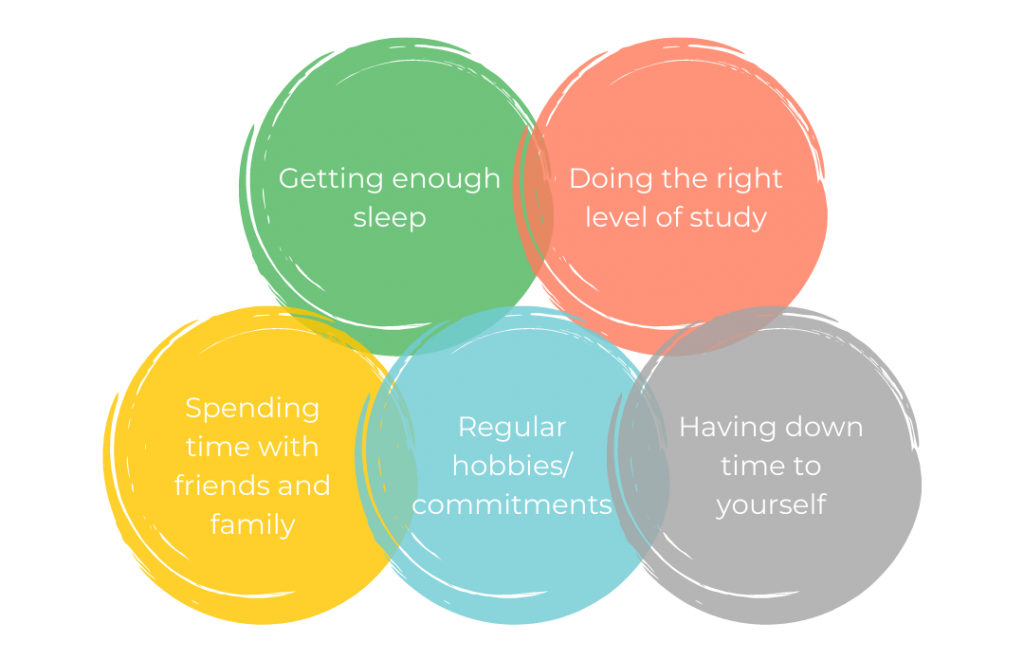For most of us, stress is a natural part of our HSC experience. This makes total sense — you’re trying to study, socialise, sleep, exercise and probably have a part-time job in the mix!
In fact, a healthy amount of stress is actually a good thing for keeping you motivated and on track.
We took a deep dive into identifying what healthy stress is and how you can manage your stress levels throughout the HSC. We also chatted to Dr Ellie Kirk, a registered counsellor who has worked with children and young people in schools (including during the 2020 Melbourne lockdown!).
Let’s get started!
What is healthy stress?
Tip #1: Create a schedule and stick to it!
Tip #2: Exercise regularly
Tip #3: Maintain a good social life
Tip #4: Find some easy hobbies
Tip #5: Get help from someone else
What is healthy stress?
Healthdirect defines healthy stress as a short term feeling that stems directly from a current challenge. This type of emotion can be motivating and push you to succeed.
However, when stress becomes long-term and overwhelming, it may be time to seek help or put some tactics in place. Read on to find out some vital tips to dealing with stress through the HSC!
Tip #1: Create a schedule and stick to it!
One of the best ways to bust stress is by having a consistent schedule.
During Year 12, it may not be realistic to treat every day as the same — you will naturally have periods of very busy workloads, followed by gaps of free time. However, creating a schedule at the start of each week and sticking to it is incredibly useful!
You may like to handwrite your schedule, use a diary (you can find some beautiful, linen-bound ones online), or create a more structured timetable on Excel.
It’s important to remember that each student will need different kinds of structure throughout their study. “Some people need to learn by talking things through with others, so they [may] thrive in a study group, but others need lots of alone time to process,” Dr Kirk explained.
You may be very tasked-based, or perhaps you prefer your time to be divided up by hours.
“[Other] people are kinaesthetic learners and learn best while moving their body; so reading or dictating out notes while on a treadmill or exercise bike… Or even just using a fidget toy can help engage their brains a bit better,” Dr Kirk added.
Take a few weeks to figure out what works best for you!
For any student, however, here are some important things to consider when managing your time:
Getting enough sleep
As a student, you need sleep to feel well-rested and excel at all your responsibilities. Sleep Health Foundation recommends eight to ten hours of sleep for 16-17 years olds and seven to nine hours of sleep for 18 year olds.
Doing the right level of study
Succeeding in Year 12 is really about balance. You want to be studying enough that you feel comfortable with all content and are submitting work on time, but it is easy to soak your entire evening up with school tasks.
Dr Kirk suggested most students should study for “no more than two hours” at a time, especially on top of a regular school day. “After two hours, you won’t have much of an attention span left. There’s a reason that not many movies go for longer than two hours,” she said.
Set yourself set study times and boundaries, and make sure you stop when you say you will. You’re never going to be performing at your maximum if you’re too stressed to have a break.
It’s also worth considering that the old ‘study smart, not hard’ quote rings true. Learning how to study can really cut down the hours you spend at your desk. As you progress, you’ll find the study techniques that work best for you!
Spending time with friends and family
Prioritising at least two social activities a week can be a life-saver for your mental health. Even if it’s just a 30 minute dog walk with your friend, you’ll see a big change in stress levels during the HSC when you enjoy time with others.
Try writing times into your schedule for this each week!
Regular hobbies/commitments
Sitting your HSC doesn’t mean you have to drop all the fun things from your life!
“This is very important! Especially if fun things keep you connected to important people; help you to relax; move your body; or engage your brain creatively,” Dr Kirk said.
Having down time to yourself
When you’re creating a schedule, it can be very easy to fill in blank spaces with activities.
Remember, there is nothing wrong with a bit of Netflix or a bubble bath! Check out this guide to get some new TV recommendations!
Tip #2: Exercise regularly
Exercise is proven to be a vital stress reliever. When we get our bodies moving, endorphins (the chemicals that make us happy) are released. Even better, exercise can reduce the levels of cortisol and adrenaline in your body, which will help to relieve stress!
According to the University of Sydney, even a 20-minute walk can help reduce anxious feelings.
“There is also good evidence to suggest that exercise can be as effective as medication in mild to moderate depression,” Dr Kirk said. If you’re up for a bit of a read, this abstract will tell you more!
A great way to stay accountable is by joining a gym or a casual sports team. If this really isn’t your style, nearby walking courses, at home workouts or yoga may do the trick. Most Local Councils will also let you book sporting fields and tennis courts on a casual basis.
You can find the public spaces in the City of Sydney area listed here!
The great thing is, you don’t even have to leave your house! There’s some excellent yoga and workout plans available for free on Youtube, which can also be useful if you’re tight on money.
Whilst we’re on the topic of health, it can also be really easy to grab chocolate and chips to eat. It’s important to keep a balanced diet, and that often includes snacking.
However, you will feel much better in the long-term if you balance these snacks with nutritious meals that fuel your body. If you want to know more, check out this government page.
Tip #3: Maintain a good social life
Have you chatted to your parents much this week? Gotten coffee or gone skating with your mates? If not, you may not be making enough time for relationships during your week.
As we have already touched on, it’s really important to surround yourself with people who will help you feel valued and grounded throughout your HSC year.
‘”It’s normal to feel confused and disoriented in Year 12, especially with the pressures of HSC and working out what happens next,” Dr Kirk said.
One of the best ways to stay connected to what’s important to you is by scheduling in time for friends and family.
ABC News has also covered how keeping in touch with your wider cohort can keep you all on track and relaxed. The Facebook HSC Discussion Group is a great way to relieve some HSC stress!
Tip #4: Find some easy hobbies
Believe it or not, Year 12 can be a great time to find a casual hobby that interests you! We’ve already talked about maintaining your usual activities, but perhaps you need a change of scene.
Hobbies shouldn’t be an excuse for you to place another element of pressure on yourself. Instead, they should be enjoyable and rewarding.
Think something like cross-stitch, ceramics, a new instrument, video games or reading. You may even find it fun to branch into areas that you don’t usually consider trying!
These hobbies should take your mind off school and allow you to feel more relaxed while you’re doing them. Finding a new activity with a group of friends can also be a great way to do this.
Tip #5: Get help from someone else
The reality is, HSC can be an incredibly stressful year. If it continues to feel overwhelming, you may need to seek help from someone you trust.
Though parents and carers are great, we totally get it you don’t feel like venting to them right now. Talking to your school counsellor or mentor teacher is a good place to start — they will be trained in tactics to help you.
“Counsellors can help by just listening impartially, by sharing tactics that have worked for other students, or reflecting back at them something that they might not have considered but find really helpful.
“Counsellors can also talk about other things in their life that are making HSC more difficult than it needs to be — like mental health challenges, relationships, family stuff, or difficult life events,” said Dr Kirk.
If you’d like to talk to someone anonymous, here are some places you can go:
-
- Headspace – find a centre here
- Lifeline – 13 11 14
- Kids Helpline – 1800 55 1800
Most importantly, remember that you are probably doing a much better job than you think you are, even with all the stress surrounding the HSC. In just a year, you’ll be out of school and on with your life — remember that!
Lucinda Garbutt-Young hopes to one day be writing for a big-shot newspaper… or maybe just for a friendly magazine in the arts sector. Right now, she is enjoying studying a Bachelor of Public Communication (Public Relations and Journalism) at UTS while she writes on the side. She also loves making coffees for people in her job as a barista, and loves nothing more than a sun shower.





